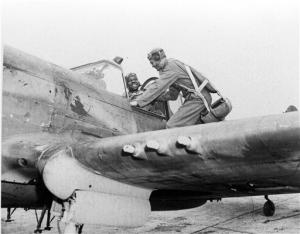26 June 2008:
ATLANTA, Georgia — Lieutenant Colonel Charles “Chuck” Dryden, one of the first of the pioneering black World War II pilots known as the Tuskegee Airmen, has died. He was 87.
Dryden died Tuesday in Atlanta of natural causes, said Roger Neal, a spokesman for the National Museum of Patriotism in Atlanta. Dryden was on the museum’s board of directors.
In this April 7, 1943 file picture, Lieutenant Colonel Benjamin O. Davis, Jr. talks with Lieutenant Charles W. Dryden
before Dryden goes on a mission in a P-40 fighter plane at the Army Air Base, in Tuskegee, Alabama
)
“He was not just a part of American history; he helped to make it,” museum founder Nick Snider said Thursday.
Dryden’s 21-year military career included combat missions in Korea and assignments in Japan, Germany and U.S. bases. He retired from the Air Force in 1962.
About 1,000 pilots trained as a segregated Army Air Corps unit at the Tuskegee Army Flying School in Alabama during World War II.
Dryden was selected for aviation cadet training at Tuskegee in August 1941, only a month after the program began and four months before the U.S. entered World War II.
He was one of three men commissioned in April 1942 as a Second Lieutenant. Just five pilots had earned their wings in the program ahead of Dryden’s class of three.
Dryden was a member of the famed 99th Pursuit Squadron and later the 332nd Fighter Group, which served in North Africa and Italy.
His P-40 airplane was nicknamed “A-Train,” and Dryden titled his autobiography “A-Train: Memoirs of a Tuskegee Airman.” It was published by the University of Alabama Press in 1997.
Last year, President Bush and Congress awarded the Tuskegee Airmen the Congressional Gold Medal. Some 300 surviving airmen — including Dryden — gathered in Washington for the ceremony in March 2007.
While attending the Washington gathering, Dryden told The Associated Press that he had mixed feelings about the event, since it came so many years after the war. But he added that the medal helped convince him that the country does recognize the airmen’s contributions.
“It’s really something,” he said.
He recalled that after returning from his overseas service, he was stationed in Walterboro, South Carolina, where he saw German prisoners of war get privileges in theaters and cafeterias that were denied to black soldiers.
Dryden was born in 1920 in New York City to Jamaican parents. He earned a bachelor’s degree in political science from Hofstra University and a master’s degree in public law and government from Columbia University.
In 1998, Dryden was inducted into the Georgia Aviation Hall of Fame. He was also a professor of air science at Howard University.
Hundreds pay last respects to Tuskegee Airman
Courtesy of The Atlanta Journal-Constitution
Hundreds gave Tuskegee Airman Lieutenant Colonel Chuck Dryden a final send off into the heavens Tuesday.
Relatives, friends and other admirers gathered at Cascade United Methodist Church in southwest Atlanta to say their final goodbyes to the World War II fighter pilot who helped break down racial barriers in the U.S. military.
Dryden — nicknamed “A-Train” — was a member of one of the most successful squadrons in American history and was one of the first African-Americans to lead a squadron into battle.
Members of his all-black 99th fighter squadron flew more than 15,000 missions and were in high demand because of their bomber escort safety record.
Dryden died June 24, 2008, at age 87 after a short illness. The Air Force retiree’s farewell on Tuesday included a flyover and military honors.
Andrew Young, former Atlanta mayor and U.S. ambassador to the United Nations, sought to put Dryden’s accomplishments in historical context during the service, which also drew a slew of dignitaries including U.S. Repesentative John Lewis (D-Georgia) and Atlanta Mayor Shirley Franklin.
Dryden is part of a long line of African-Americans, from Crispus Attucks to Jesse Owens and others, who helped shape American history while living in times of discrimination, Young noted. He said God used these “stones that the builders rejected” and made them cornerstones of change.
With a humor and emotion, Eric Dryden offered remembrances of his father and their time spent together, especially flying. Growing up, it never occurred to him that most dads don’t fly and that he was part of aviation royalty.
“I thank you for being my father and I thank God for letting me be your wing man,” the younger Dryden said.
Speakers included Colonel Clarence Jamison Sr., who along with Dryden in 1942 was in the second class of cadets to graduate from flight training at Tuskegee Institute in Alabama.
Jamison, 90, of Shaker Heights, Ohio, called Dryden “the best friend I ever had.”
“I salute you, buddy. See you soon. Bye,” said Jamison. He is the last living member of that class, a status that earned him a bucket of champagne Tuesday based on a long-standing pact with Dryden and a third classmate.
Dryden, a First Congregational Church member and a retiree of Lockheed Martin’s Marietta facility, won praise for his willingness to mentor and to share his story with students and civic groups. Among those he inspired is Reto Smith Jr., a Martin Luther King Jr. High School graduate.
“It really hits close to home,” said Smith, 18, an Aviation Career Enrichment program participant who leaves soon for the U.S. Naval Academy.
“He was really role model and example.”
Dryden will be buried at Arlington National Cemetery in Virginia.
Michael Robert Patterson was born in Arlington and is the son of a former officer of the US Army. So it was no wonder that sooner or later his interests drew him to American history and especially to American military history. Many of his articles can be found on renowned portals like the New York Times, Washingtonpost or Wikipedia.
Reviewed by: Michael Howard

